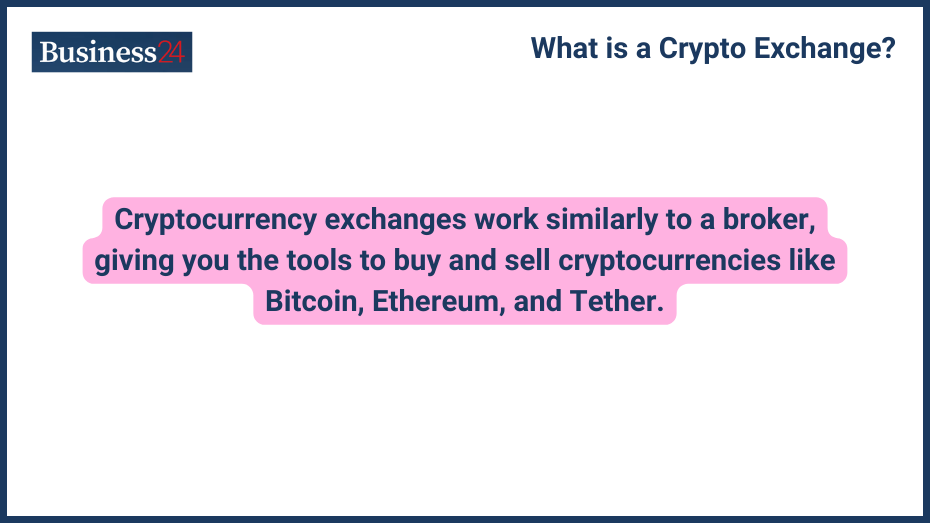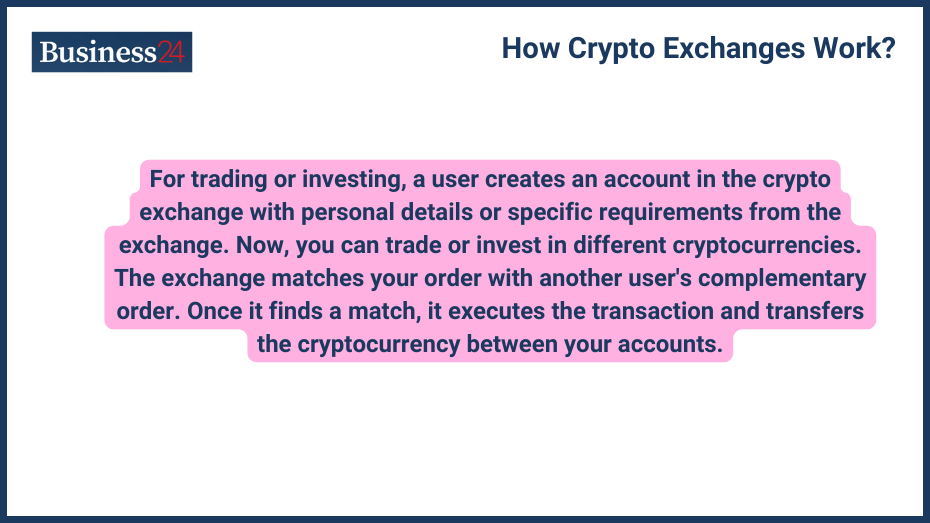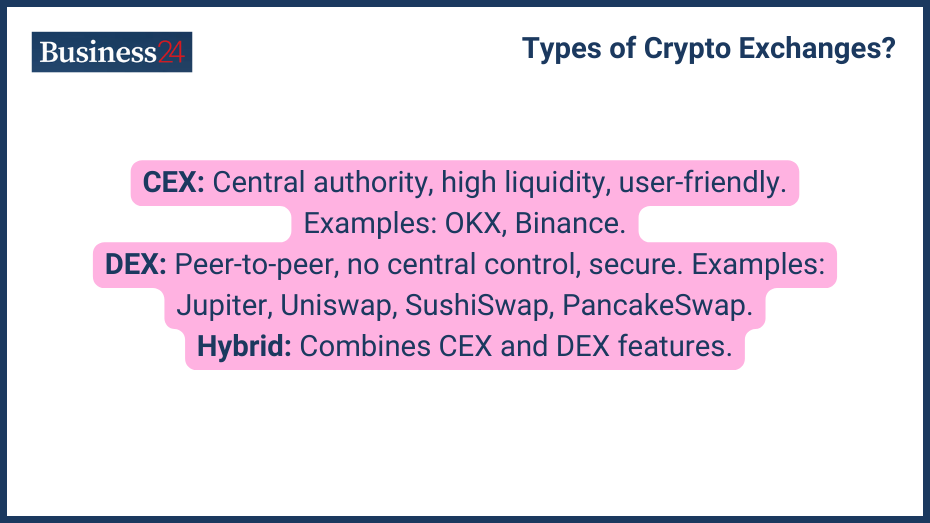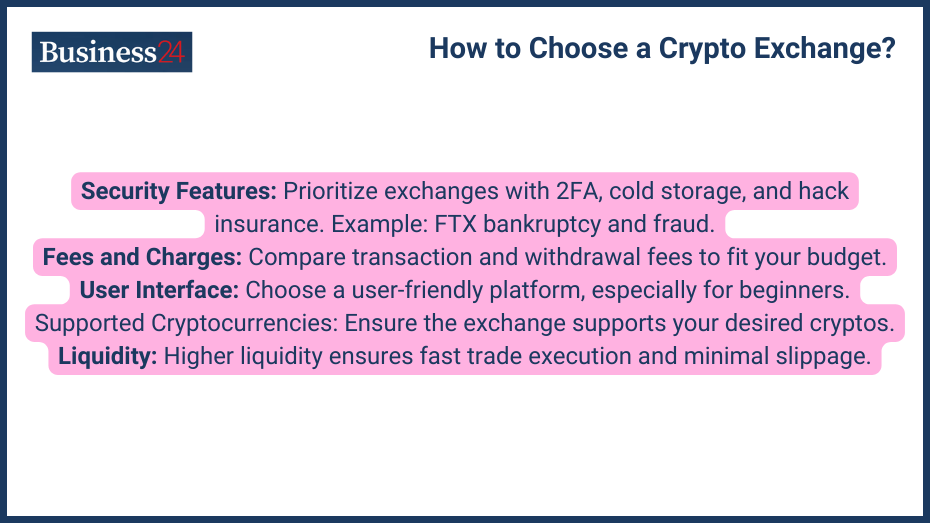
Cryptocurrency exchanges work similarly to a broker, giving you the tools to buy and sell cryptocurrencies like Bitcoin, Ethereum, and Tether.
Cryptocurrencies have opened a new world, and After the data boom, crypto became the new oil. Crypto has added a new dimension to the financial landscape and seems like the future of it. Crypto exchanges make the buying and selling of cryptocurrencies possible. To understand the crypto completely, it is important to understand the crypto exchanges.
What is the Definition of a Crypto Exchange?
A crypto exchange is an online marketplace where users or we can say traders or investors, buy, sell, and trade cryptocurrencies. Like traditional stock exchanges, they connect buyers and sellers, facilitating transactions and ensuring liquidity. With the help of this platform, you can exchange cryptos such as Bitcoin, Ethereum, and other cryptocurrencies.
Crypto exchanges work as an intermediary between a buyer and seller; they are important because it is hard for a buyer to find a seller and vice versa without these platforms. Crypto exchange keeps a record of buy and sell orders for different cryptocurrencies. When someone places an order to buy or sell, the exchange matches it with an opposing order from another trader.
There is little difference between crypto and stock exchanges besides the assets traded on both platforms. Another difference is the time and regulation of the exchanges; stock exchanges are highly regulated and operate in a limited time per day, while crypto exchanges are still evolving and are not very regulated and operate 24/7.
How does crypto exchange work?

The workings of crypto exchanges are simple and similar to those of other asset exchanges. For trading or investing, a user creates an account in the crypto exchange with personal details or specific requirements from the exchange. Now, you can trade or invest in different cryptocurrencies.
The exchange matches your order with another user’s complementary order. Once it finds a match, it executes the transaction and transfers the cryptocurrency between your accounts.
What are examples of crypto exchanges?
There are some big names in the industry now after the popularization of cryptocurrencies. On the top is Binance, which is the largest crypto exchange in terms of daily trading volume of cryptocurrencies. It was founded in 2017 by Changpeng Zhao. Other big names are Coinbase, Kraken, Bitfinex,etc.
What are the Types of Crypto Exchanges?

Types of Crypto Exchanges are:
- Centralized Exchanges (CEX): Centralized exchanges are the most common types of crypto exchanges and are operated by a central authority that manages order books and matches trades. They offer a user-friendly interface, high liquidity, and various features like margin trading and fiat (traditional currency) on-ramps. Examples include Binance, Coinbase, and Kraken.
- Decentralized Exchanges (DEX): Decentralization is the reason cryptocurrencies are so famous right now. Decentralized exchanges operate on a peer-to-peer (P2P) model, meaning there’s no central authority and no one to control.
Transactions are facilitated by smart contracts on a blockchain network, offering greater security and transparency. However, DEXs typically have lower liquidity and a less user-friendly interface compared to CEXs. Examples include Uniswap, SushiSwap, and PancakeSwap. - Hybrid Exchanges: Hybrid exchanges are a combination of Centralized and decentralized exchanges. It carries features of CEXs and DEXs, offering a balance between security, user experience, and decentralization.
How to Choose a Crypto Exchange?

Before choosing a crypto exchange, analyze your needs and look for those exchanges that fulfill your needs. Here are some of the criteria you should look for in a crypto exchange:
- Security Features: One of the bad things the crypto technology has brought is more scams because of not good regulations. One example is FTX Exchange, which went bankrupt, and its CEO has been jailed for fraud. While choosing a exchange, prioritize robust security measures like two-factor authentication (2FA), cold storage for a significant portion of user funds, and insurance against potential hacks.
- Fees and Charges: Compare transaction fees, withdrawal fees, and any other applicable charges to find an exchange that aligns with your trading volume and budget.
- User Interface and Experience: A user-friendly platform with clear navigation and intuitive functionalities is essential, especially for beginners.
- Supported Cryptocurrencies: Ensure the exchange offers the cryptocurrencies you’re interested in trading. It is not necessary for an exchange to contain all the cryptos.
. - Liquidity and Volume: Ensure you don’t face liquidity problems with your exchange. Higher liquidity ensures faster trade execution and minimizes slippage.
How to Use a Crypto Exchange?
Here is the step-by-step process on how to use the crypto exchange:
- Setting Up an Account: You have to choose a crypto exchange and set up an account in it. According to your needs and goals, choose a reputable exchange, create an account, and complete the verification process.
- KYC and Verification Processes: Many exchanges require KYC verification, which involves submitting government-issued IDs and other documents to confirm your identity. Decentralized exchanges like Uniswap do not require a KYC process.
- Depositing Funds or Crypto: After you have successfully set up an account in the chosen exchange, to buy crypto, you need to deposit money, or you can directly deposit crypto from another wallet. You can add funds via bank transfers, credit/debit cards (depending on exchange and regulations), or deposits using other cryptocurrencies.
- Buying and Selling Cryptocurrencies: Once your funds or cryptos are deposited, browse the exchange’s offerings and select the cryptocurrency you want to buy or sell. Specify the amount and choose the order type.
- Withdrawing Funds: When you want to convert your cryptocurrency back to fiat currency or transfer it to a different wallet, initiate a withdrawal request. Be aware of any associated withdrawal fees.
What is the difference between crypto trading and crypto exchange?
Crypto trading and crypto exchange are two different things; a crypto exchange is a place that allows you the facility to trade or invest in cryptocurrencies. While, crypto trading is simple buying and selling of the cryptocurrencies. Crypto exchanges are the platforms where crypto trading is one.
What are the Benefits of Using Crypto Exchanges?
There are various benefits of using crypto exchanges, which are the following:
- Access to a Wide Range of Cryptocurrencies: Crypto exchanges give you access to a wide range of cryptocurrencies, and you can diversify your portfolio with different cryptos and utilities.
- Ease of Trading: For a beginner trader, an easy and understandable interface is important; reputable exchanges like Binance and Exodus provide good trading interfaces.
- Enhanced Liquidity: Famous exchanges have high liquidity because high-volume trading is done in them, and it is important for a trader to trade in liquid instruments so he can sell his holdings anytime he wants.
- Advanced Trading Features: With many crypto exchanges, you can get benefits like margin trading and advanced order types, which can improve your profitability and winning potential.
- Educational Resources and Tools: Crypto exchanges provide educational resources and analytics tools to help users make informed investment decisions.
What are the Risks and Challenges of Using Crypto Exchanges?
The whole Web3 technology has brought many benefits as well as many risks and challenges, which are important for a trader to understand so he does not make any mistakes:
- Security Breaches and Hacks: Nowadays, crypto exchanges are prime targets for hackers. You have to check whether the exchange you are choosing complies with high-security standards.
- Regulatory Risks: Cryptocurrencies are a new asset class and are still under development. So, there are not many regulations and regulatory bodies in the crypto space, which can affect your funds.
- Market Volatility: The cryptocurrency market is highly volatile, and prices fluctuate significantly. This volatility can affect your positions and holdings.
- Counterparty Risks: When you trade on a centralized exchange, you trust the exchange to handle everything. However, if the exchange runs into financial trouble or technical problems, your money could be at risk.
- Potential for Scams and Fraud: while trading in the crypto market, stay aware of phishing and fraudulent schemes targeting cryptocurrency users, retail investors are prone to these scams.
What are the Key Features of Leading Crypto Exchanges?
The key feature of leading crypto exchange:
- Security Measures: Security is the major thing in the crypto world; a leading crypto exchange must have great security features and safeguard investors from any kind of glitches or scams.
- Trading Tools and Features: Out there are some good exchanges that provide different kinds of trading features like the different types of orders, margin trading availability, and charting tools for technical analysis.
- Customer Support and Service: While starting or at any moment, you can come across difficulties on the platform. Good exchanges provide responsive and helpful customer support that will help you solve issues with your account or the platform.
- Mobile App and Platform Accessibility: For traders, a user-friendly mobile app and accessible web platform are necessary for a good trading experience and to manage your portfolio on the go.
- Reviews and Reputation: Research user reviews and the exchange’s reputation within the cryptocurrency community.
What are the Legal and Regulatory Aspects of Crypto Exchanges?
Legal and Regulatory Aspects of Crypto Exchanges:
- Global Regulatory Landscape: Different countries have different regulations, and governing bodies have made different rules. Some countries have implemented stricter regulations, while others are taking a more relaxed approach.
- Compliance Requirements: Crypto exchanges must comply with the regulations set forth by the jurisdictions in which they operate. These regulations might include KYC/AML (Anti-Money Laundering) procedures.
- Impact of Regulations on Operations: Regulations can impact how crypto exchanges operate, such as restricting certain features or user access for residents of specific countries.
- Future Regulatory Trends: The crypto market and its future are unpredictable. So, no one could answer the future trends exactly. You have to check regulatory updates in your country constantly.
How to Secure Your Assets on a Crypto Exchange?
- Enable Two-Factor Authentication (2FA): Two-factor authentication adds an extra layer of security by requiring a second verification code in addition to your password when logging in. This will help you secure your assets on a crypto exchange.
Some exchanges offer Multi-Factor Authentication (MFA) as an alternative or in addition to 2FA. MFA can involve fingerprint or facial recognition for login verification. - Use Strong Passwords: Another important point is to create a strong password. You have to create unique and complex passwords for your exchange account and avoid using the same password for multiple platforms.
- Using Hardware Wallets: Storing crypto on a hardware wallet is the best way to secure your cryptos. It enhances security and safeguards from scams.
- Regular Monitoring and Audits: Regularly monitor your account activity and transaction history to identify any suspicious activity. It’s also advisable to conduct security audits of the exchange you use to assess their overall security posture.
What is the Future of Crypto Exchanges?
The Future of Crypto Exchanges:
- Emerging Technologies: Integration with Decentralized Finance (DeFi) protocols and Layer 2 scaling solutions has the potential to revolutionize crypto exchanges, offering greater security, faster transaction speeds, and innovative financial products.
- Market Trends and Predictions: The crypto exchange landscape is expected to experience continued growth and adoption as the cryptocurrency market matures.
- Potential for Innovation and Growth: Crypto exchanges have the potential to become one-stop shops for all your cryptocurrency needs, offering not just trading but also staking, lending, and other DeFi functionalities.
- Challenges and Opportunities Ahead: Regulatory uncertainty, security threats, and competition from new entrants pose challenges but also opportunities for innovation and adaptation within the crypto exchange industry.
What are the FAQs about Crypto Exchanges?
FAQs
Q: Is it safe to use crypto exchanges?
A: The safety of crypto exchanges depends on the platform itself. Always prioritize the self-custody of your cryptocurrency using a hardware wallet for maximum security. Also, dont put so much money that will affect your financial health.
Q: What are the fees associated with crypto exchanges?
A: Crypto exchanges typically charge transaction fees, withdrawal fees, and other charges. Compare fees across different exchanges to find one that aligns with your trading volume and budget.
Q: Can I use a credit card to buy cryptocurrency in exchange?
A: Some exchanges allow credit card purchases, but these transactions often come with higher fees and potential restrictions. It’s advisable to proceed with caution and understand the associated terms and conditions before using a credit card for crypto purchases.
Q: How do I choose the right crypto exchange for me?
A: write down your needs and priorities when choosing a crypto exchange. Security, fees, user interface, supported currencies, and liquidity are all important factors you should evaluate before choosing the right crypto exchange.
Q: What are the risks of crypto trading?
A: There are many risks associated with crypto trading, and one that made me lose is the high volatility. Other risks include lower liquidity and potential fraud.
Conclusion
Crypto exchanges are important because they give traders and investors a platform to buy and sell. Before choosing any crypto exchange, there are many points to consider; you have to analyze your needs and goals and choose accordingly. Also, stay updated on the important regulatory changes that can impact your portfolio.
Disclaimer
eToro is a multi-asset platform which offers both investing in stocks and cryptoassets, as well as trading CFDs.
Please note that CFDs are complex instruments and come with a high risk of losing money rapidly due to leverage. 51% of retail investor accounts lose money when trading CFDs with this provider. You should consider whether you understand how CFDs work, and whether you can afford to take the high risk of losing your money
This communication is intended for information and educational purposes only and should not be considered investment advice or investment recommendation. Past performance is not an indication of future results.
Copy Trading does not amount to investment advice. The value of your investments may go up or down. Your capital is at risk.
Don’t invest unless you’re prepared to lose all the money you invest. This is a high-risk investment and you should not expect to be protected if something goes wrong. Take 2 mins to learn more
eToro USA LLC does not offer CFDs and makes no representation and assumes no liability as to the accuracy or completeness of the content of this publication, which has been prepared by our partner utilizing publicly available non-entity specific information about eToro.
